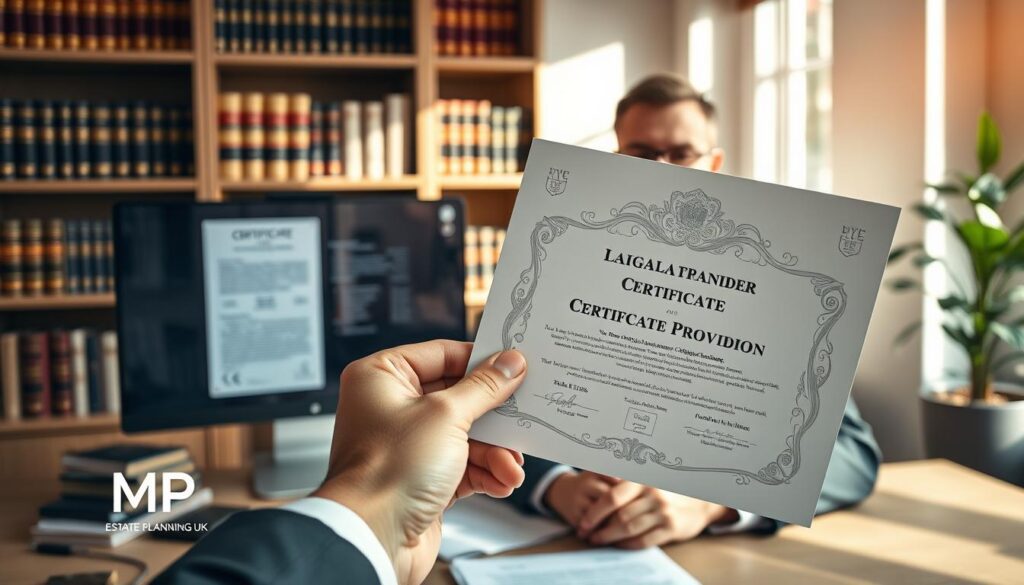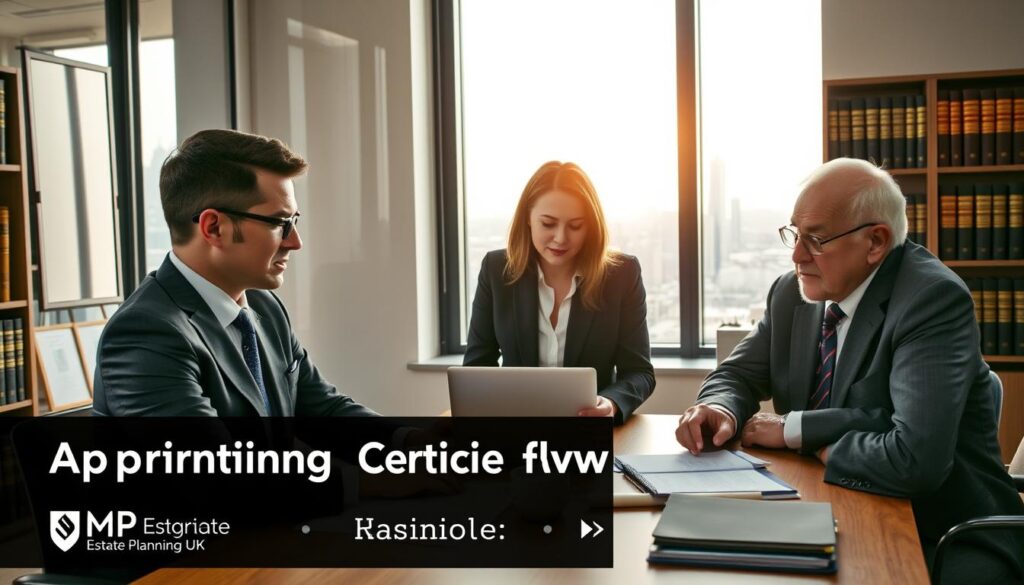Did you know that over 3.5 million Lasting Powers of Attorney (LPAs) have been registered in the UK since their introduction? This significant figure highlights the growing importance of LPAs in safeguarding individuals’ financial and health decisions. A crucial aspect of creating an LPA is the role of the Certificate Provider, who confirms that the Donor understands the LPA and is not under undue pressure.
We guide you through the updated rules and examples to understand who can be a Certificate Provider. The person must be at least 18 years old and independent of the Donor and Attorneys. This ensures the LPA is created fairly and without coercion.
Key Takeaways
- A Certificate Provider must be at least 18 years old.
- The Provider should not be related to the Donor or Attorneys.
- Their role is to confirm the Donor’s understanding and lack of coercion.
- For more information on LPA forms, visit our guide on where to get Lasting Power of Attorney forms in the.
- Understanding the eligibility criteria is crucial for a valid LPA.
Understanding Lasting Powers of Attorney (LPA)
Understanding the concept of Lasting Powers of Attorney is vital for anyone looking to secure their future and manage their affairs effectively. A Lasting Power of Attorney (LPA) is a legal document that allows the Donor to appoint one or more Attorneys to make decisions on their behalf.
What is a Lasting Power of Attorney?
A Lasting Power of Attorney is a legal instrument that enables individuals to plan for their future, ensuring that their affairs are managed according to their wishes, even if they lose mental capacity. “An LPA is an essential tool for protecting one’s autonomy and financial security,” as stated by the UK’s Office of the Public Guardian.
Types of LPA
There are two primary types of Lasting Powers of Attorney in the UK:
- Property and Financial Affairs LPA: This allows Attorneys to manage the Donor’s financial affairs, including managing bank accounts, selling property, and making financial decisions.
- Health and Welfare LPA: This enables Attorneys to make decisions regarding the Donor’s health and welfare, such as medical treatment and living arrangements.
For more information on the process of creating an LPA, you can visit the Office of the Public Guardian’s blog.
Importance of an LPA
Having a Lasting Power of Attorney in place is crucial for several reasons. It ensures that the Donor’s wishes are respected and that their affairs are managed by someone they trust. This is particularly important in the event of mental incapacity, where the Donor is unable to make decisions for themselves. For guidance on where to send your LPA forms, you can refer to MP Estate Planning’s resource.
By understanding LPAs and their significance, individuals can better appreciate the role of Certificate Providers in the LPA process, ensuring compliance with regulatory standards and accreditation guidelines.
Certificate Provider Role Explained
A Certificate Provider is essential for confirming that the Donor understands the Lasting Power of Attorney (LPA) and is not under undue influence. This role is crucial in ensuring the validity and integrity of the LPA process.
What is a Certificate Provider?
A Certificate Provider is an independent individual who confirms that the Donor has made the decision to create an LPA voluntarily and with full understanding. They sign the LPA after the Donor and the Donor’s witness, verifying that the Donor is not being pressured or coerced into making the LPA. The Certificate Provider’s role involves provider assessment procedures to ensure the Donor’s mental capacity and willingness to create the LPA.
The Certificate Provider must be impartial and have no vested interest in the LPA. This independence is crucial for the integrity of the certification process. For more information on the witnessing process, you can visit our page on who can witness a Lasting Power of Attorney in the.
The Importance of a Certificate Provider in the LPA Process
The Certificate Provider plays a pivotal role in the LPA process by ensuring that the Donor’s decision is informed and voluntary. Their involvement adds a layer of protection against potential abuse or exploitation. The Certificate Provider’s verification is a critical step in the certification process, providing assurance that the LPA is valid and reflects the Donor’s true intentions.
Some key aspects of the Certificate Provider’s role include:
- Confirming the Donor’s understanding of the LPA
- Verifying that the Donor is not under undue influence
- Ensuring the Donor has the mental capacity to make the LPA
By fulfilling these responsibilities, the Certificate Provider helps to safeguard the Donor’s interests and ensures that the LPA is executed in accordance with their wishes. The importance of selecting a suitable Certificate Provider cannot be overstated, as they are a crucial part of the LPA process.

Eligibility Criteria for Certificate Providers
The eligibility criteria for Certificate Providers are designed to ensure impartiality and capability in assessing the Donor’s understanding and capacity. To be eligible, an individual must meet specific requirements that validate their suitability for this critical role.
Who Can Be a Certificate Provider?
To act as a Certificate Provider, an individual must be aged 18 or over. They must either have known the Donor for at least two years or possess relevant professional skills that qualify them for this role. This ensures that the Certificate Provider has a sufficient understanding of the Donor or the necessary expertise to assess their mental capacity.
It is also crucial that the Certificate Provider is not related to the Donor or the Attorney(s) appointed under the LPA. This stipulation helps maintain the impartiality of the Certificate Provider, ensuring that their confirmation is unbiased and based solely on the Donor’s capacity and understanding.
Key Qualifications Required
The key qualifications for a Certificate Provider can be summarized as follows:
| Qualification | Description |
|---|---|
| Age | Must be 18 years or older |
| Relationship with Donor | Known the Donor for at least two years or have relevant professional skills |
| Impartiality | Not related to the Donor or Attorney(s) |
By adhering to these eligibility criteria, Certificate Providers can effectively confirm the Donor’s understanding and capacity, thereby supporting the validity and integrity of the LPA process.

The Role of Professionals as Certificate Providers
In the context of LPAs, professionals such as solicitors and healthcare experts can serve as Certificate Providers, bringing a level of expertise that is invaluable in assessing the Donor’s mental capacity and understanding.

Solicitors and Their Qualifications
Solicitors are among the most commonly chosen professionals to act as Certificate Providers due to their legal expertise. To qualify, solicitors must be regulated by the Solicitors Regulation Authority (SRA) and adhere to strict regulatory standards. This ensures that they are equipped to assess the Donor’s understanding and capacity accurately.
As Certificate Providers, solicitors verify that the Donor understands the implications of the LPA, providing an independent confirmation that the document is executed voluntarily and with the Donor’s full comprehension.
Other Professionals Eligible
Apart from solicitors, other professionals can also act as Certificate Providers, including healthcare professionals and social workers. These individuals are often well-placed to assess mental capacity due to their direct involvement in the Donor’s care or their expertise in evaluating cognitive functions.
“The role of a Certificate Provider is not just a formality; it is a crucial safeguard that ensures the Donor’s rights and wishes are respected.” –
When selecting a professional as a Certificate Provider, it is essential to consider their qualifications, experience, and familiarity with the certification process and compliance criteria. This ensures that the LPA is executed in accordance with legal requirements and that the Donor’s best interests are protected.
- Healthcare professionals with experience in assessing mental capacity.
- Social workers who have been involved in the Donor’s care.
- Solicitors regulated by the SRA.
By choosing a professional who is well-versed in the regulatory standards and certification process, Donors can ensure that their LPA is robust and compliant with current legislation.
Family and Friends as Certificate Providers
Family and friends can act as Certificate Providers for LPAs, but there are specific guidelines they must follow. When considering who to appoint, it’s essential to understand the role and its implications.
Restrictions on Using Family Members
While family members can serve as Certificate Providers, there are certain restrictions in place. They must not be appointed as Attorneys under the LPA, nor can they be closely related to the Donor or the Attorneys appointed. This ensures impartiality in the Certificate Provider’s assessment.
The restrictions are designed to prevent conflicts of interest and ensure that the Certificate Provider can independently verify the Donor’s capacity and understanding. Eligibility criteria are crucial in this context, as they help determine whether a family member or friend can undertake this role effectively.
| Relationship to Donor/Attorney | Eligible as Certificate Provider |
|---|---|
| Spouse or Civil Partner | No |
| Children or their spouses | No |
| Other relatives not closely related | Yes, if not an Attorney |
| Friends not closely related to Attorneys | Yes |
Responsibilities of Family Certificate Providers
Family Certificate Providers, like all Certificate Providers, have a critical role in verifying the Donor’s mental capacity and understanding of the LPA. They must be impartial and ensure that the Donor is not under any undue influence.
The responsibilities include assessing the Donor’s capacity, completing the Certificate Provider section of the LPA form, and signing the document to confirm their assessment. It’s a role that requires provider assessment procedures to be followed diligently.
Training prerequisites are not typically required for family or friend Certificate Providers, but they must understand the gravity of their role and the information they are providing.

Independence in Certificate Provision
Independence is a cornerstone for Certificate Providers, ensuring that LPAs are executed without undue influence. We cannot stress enough how crucial it is for a Certificate Provider to act independently and impartially when assessing a donor’s mental capacity.

Importance of Impartiality
The role of a Certificate Provider demands impartiality to validate that the donor understands the implications of the LPA and is not under any pressure. This impartiality is what upholds the integrity of the LPA process, ensuring it is fair and just.
To maintain accreditation guidelines and adhere to regulatory standards, Certificate Providers must be free from any conflict of interest. This means they should not be closely related to the donor or the attorneys appointed under the LPA.
Factors Influencing Impartiality
Several factors can influence a Certificate Provider’s impartiality, including personal relationships, financial interests, and professional biases. We must consider these factors carefully to ensure compliance with the compliance criteria set forth by the relevant authorities.
- Personal relationships that could sway judgment
- Financial interests that might influence decisions
- Professional biases that could affect impartiality
By understanding these factors and taking steps to mitigate them, Certificate Providers can maintain the highest level of independence and impartiality, thereby safeguarding the LPA process.
Process of Appointing a Certificate Provider
To create a valid Lasting Power of Attorney (LPA), it’s essential to understand how to appoint a Certificate Provider correctly. The Certificate Provider plays a crucial role in confirming the Donor’s mental capacity and ensuring they are not under any undue pressure.
Steps to Appoint a Provider
Appointing a Certificate Provider involves several key steps. First, the Donor must choose a Certificate Provider and ensure they are willing to act. This involves discussing the role and its responsibilities with the potential Certificate Provider to confirm their willingness and ability to undertake the task.
The Donor should then provide the Certificate Provider with all necessary information about the LPA, including their wishes and the details of the Attorneys they have appointed. This ensures the Certificate Provider can make an informed decision when signing the LPA form.
- Discuss the role with the potential Certificate Provider.
- Confirm their willingness to act.
- Provide necessary information about the LPA.
As “The Office of the Public Guardian emphasises the importance of choosing a Certificate Provider who is impartial and understands the role.”
Documentation Required
The Certificate Provider must sign the LPA form after the Donor. To do this, they need to be provided with the relevant sections of the LPA document. The Donor should ensure that the Certificate Provider has access to all necessary documentation to complete their role effectively.
The required documentation typically includes:
- The LPA form itself, which the Certificate Provider needs to sign.
- Any additional information that might be relevant to the Certificate Provider’s assessment, such as medical reports or other supporting documents.
“It’s crucial that the Certificate Provider is given all the information they need to confidently sign the LPA form.”

By following these steps and ensuring the Certificate Provider has all necessary documentation, the Donor can be confident that their LPA is valid and properly executed. This process not only protects the Donor’s interests but also ensures that their wishes are respected and carried out as intended.
Responsibilities of Certificate Providers
As we navigate the complexities of Lasting Powers of Attorney (LPA), it’s essential to understand the pivotal role Certificate Providers play. The Certificate Provider’s role is multifaceted, involving a thorough assessment of the Donor’s mental capacity and confirming that they are not under undue pressure.
Assessing Mental Capacity
One of the primary responsibilities of a Certificate Provider is to assess the Donor’s mental capacity. This involves evaluating whether the Donor understands the nature and implications of creating an LPA. We must ensure that the Donor is capable of making informed decisions, free from any undue influence.
To assess mental capacity effectively, Certificate Providers should follow a structured process:
- Understand the Donor’s condition and any factors that might impact their mental capacity.
- Engage with the Donor to gauge their understanding of the LPA and its implications.
- Verify that the Donor is acting voluntarily, without coercion or undue influence.
Completing the LPA Form
After assessing the Donor’s mental capacity, the Certificate Provider must complete and sign the Certificate section of the LPA form. This step is crucial, as it confirms that the Certificate Provider has fulfilled their responsibilities.
The Certificate Provider must ensure that they complete the form accurately, providing all necessary information. This includes:
| Information Required | Description |
|---|---|
| Donor’s Details | Confirming the Donor’s identity and understanding of the LPA. |
| Certificate Provider’s Details | Providing information about the Certificate Provider, including their relationship to the Donor. |
| Confirmation Statement | A statement confirming that the Donor understands the purpose and scope of the LPA. |
For more information on the LPA process and its timelines, you can visit our page on how long it takes to set up a Lasting Power of Attorney in the.
Common Misconceptions About Certificate Providers
The role of a Certificate Provider is often misunderstood, with several myths surrounding their eligibility and responsibilities. We aim to clarify these misconceptions to provide a clearer understanding of their role in the Lasting Power of Attorney (LPA) process.
Myths vs. Reality
One common myth is that only professionals can act as Certificate Providers. However, this is not true; anyone who meets the eligibility criteria can take on this role. We must understand the compliance criteria and regulatory standards that Certificate Providers must adhere to, ensuring the LPA process is valid and legally binding.
Another misconception is that family members are automatically disqualified from being Certificate Providers. While it’s true that certain restrictions apply to family members, it’s not an outright disqualification. The key factor is their independence and ability to make an unbiased judgment regarding the donor’s capacity.
Clarifications on Roles and Functions
The role of a Certificate Provider is to confirm that the donor understands the implications of the LPA and that they’re not being pressured into making the appointment. This involves assessing the donor’s mental capacity and ensuring they’re making an informed decision.
For a clearer understanding, let’s look at the key responsibilities and the certification process involved:
| Responsibility | Description |
|---|---|
| Assessing Mental Capacity | Evaluating whether the donor understands the LPA’s implications. |
| Confirming No Undue Pressure | Ensuring the donor is not being coerced into making the LPA. |
| Completing the LPA Form | Signing the LPA form to confirm the above assessments. |
For more information on the LPA process and who can sign a Power of Attorney, you can visit our detailed guide on who signs Power of Attorney in the.
Changes in Regulations and Their Impacts
Changes in regulatory standards have brought about a new era for Certificate Providers in the LPA process. As we navigate these updates, it’s crucial to understand their implications on the certification process and future LPAs.
Recent Updates to Certificate Provider Requirements
The UK government has introduced several key updates to the certification process, aiming to enhance the integrity and reliability of LPAs. These changes include stricter accreditation guidelines for Certificate Providers, ensuring they possess the necessary expertise and impartiality.
One of the significant updates is the emphasis on the independence of Certificate Providers. The new regulations stress that Certificate Providers should not be influenced by the donor or other parties involved in the LPA, ensuring their impartiality.
- Enhanced background checks for Certificate Providers
- Stricter criteria for assessing mental capacity
- Mandatory training for Certificate Providers
Implications for Future LPAs
These regulatory changes will have a profound impact on the creation and management of future LPAs. Certificate Providers will need to adapt to the new regulatory standards, ensuring compliance and maintaining the integrity of the LPA process.
As a result, we can expect a more robust and reliable LPA system, better equipped to protect the interests of donors and their families. It’s essential for all parties involved in the LPA process to stay informed about these changes and their implications.
By understanding and embracing these updates, we can ensure that the LPA process continues to serve its purpose effectively, providing peace of mind for those planning for the future.
Examples of Suitable Certificate Providers
Certificate Providers play a vital role in the LPA process, and certain professionals are well-suited for this role. When selecting a Certificate Provider, it’s essential to consider their ability to assess the donor’s mental capacity and their independence from the appointed attorneys.
List of Professional Bodies
Several professional bodies can provide Certificate Providers with the necessary qualification specifications. These include:
- Solicitors and attorneys regulated by the Solicitors Regulation Authority (SRA)
- Healthcare professionals registered with the General Medical Council (GMC)
- Social workers registered with the Health and Care Professions Council (HCPC)
These professionals undergo rigorous training prerequisites and are bound by their respective professional codes of conduct, ensuring they can provide an impartial assessment of the donor’s mental capacity.
Real-Life Scenarios
Let’s consider some real-life scenarios to illustrate the role of Certificate Providers:
- A solicitor acting as a Certificate Provider for an elderly client creating an LPA to manage their financial affairs.
- A GP (General Practitioner) serving as a Certificate Provider for a patient with early-stage dementia, verifying their mental capacity to make decisions about their healthcare.
- A social worker acting as a Certificate Provider for an individual with learning disabilities, assessing their ability to understand and make decisions about their welfare.
In each of these scenarios, the Certificate Provider follows established provider assessment procedures to ensure the donor’s mental capacity is accurately assessed.
By choosing a suitable Certificate Provider from these professional bodies, donors can ensure their LPA is valid and their wishes are respected.
Conclusion: Importance of Choosing the Right Certificate Provider
Choosing the right Certificate Provider is crucial for the validity of a Lasting Power of Attorney (LPA) in the UK. The Certificate Provider plays a vital role in confirming that the donor has understood and made the LPA without any undue pressure.
Key Considerations
When selecting a Certificate Provider, it’s essential to consider the eligibility criteria and qualification specifications. The chosen individual must meet the certificate provider requirements LPA UK, ensuring they are impartial and capable of assessing the donor’s mental capacity.
Final Guidance
We recommend carefully evaluating potential Certificate Providers based on their ability to fulfill their responsibilities. By doing so, you can ensure that your LPA is executed effectively, providing peace of mind for you and your loved ones. Understanding the eligibility criteria and the role of a Certificate Provider is key to a smooth LPA process.


